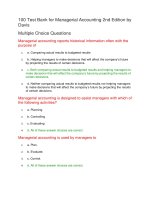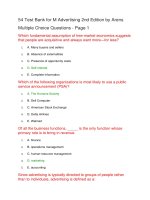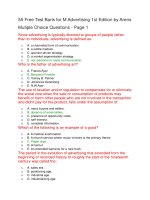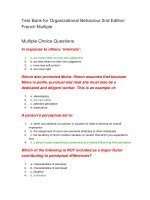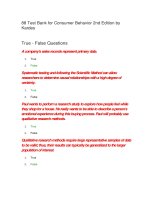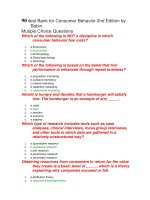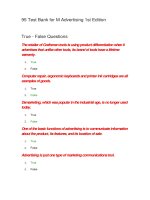99 test bank for m advertising 2nd edition by arens
Bạn đang xem bản rút gọn của tài liệu. Xem và tải ngay bản đầy đủ của tài liệu tại đây (121.33 KB, 21 trang )
99 Test Bank for M Advertising 2nd Edition by Arens
True - False Questions
Benjamin Franklin was an early critic of advertising.
1.
2.
True
False
Product differentiation is a strategy of identifying groups of
people or organizations with certain shared needs and
characteristics.
1.
2.
True
False
The ultimate goal of the marketing process is to build a
strong brand image.
1.
2.
True
False
Integrated marketing communications involves the
coordination of messages from multiple sources
including PR, television, radio, and digital media.
1.
2.
True
False
Demarketing, which was popular in the industrial age, is no
longer used today.
1.
2.
True
False
The billboard that displays an advertisement for a new
Internet service provider is an example of a medium.
1.
2.
True
False
Bo Jangles, a fast food restaurant chain, is using a
positioning strategy when it claims its chicken has the
"true taste of New Orleans."
1.
2.
True
False
Only the Internet provides advertisers with the ability to
engage in narrowcasting.
1.
2.
True
False
As a social force, advertising has been a major factor in
improving the standard of living in the United States.
1.
2.
True
False
The retailer of Craftsmen tools is using product
differentiation when it advertises that unlike other
tools, Craftsman tools have a lifetime warranty.
1.
2.
True
False
One of the functions of advertising as a marketing tool is to
build value, brand preferences, and loyalty.
1.
2.
True
False
Sales promotion is a more cost-effective marketing
communication tool than advertising.
1.
2.
True
False
The industrial age ended shortly after World War II.
1.
2.
True
False
The preindustrial age extended from the beginning of
recorded history to the first decades of the 1900s.
1.
2.
True
False
One of the basic functions of advertising is to communicate
information about the product, its features, and its
location of sale.
1.
2.
True
False
During the industrializing age, manufacturers were primarily
concerned with production rather than marketing.
1.
2.
True
False
The term mass media includes print media only. The other
mediums are part of the general media.
1.
2.
True
False
Computer repair, ergonomic keyboards, and printer ink
cartridges are all examples of goods.
1.
2.
True
False
The marketing strategy refines the target audience and
defines what responses the advertiser is seeking—
what the audience should notice, think, and feel.
1.
2.
True
False
A product's USP is the feature that differentiates it from
competitive products.
1.
2.
True
False
For Americans, the profession of advertising began when
Volney B. Palmer set up business in Philadelphia is
1841.
1.
2.
True
False
Our economy is based on the concept of perfect
competition.
1.
2.
True
False
Advertising is just one type of marketing communications
tool.
1.
2.
True
False
With the advent of public schooling, the United States
reached an unparalleled 90 percent literacy rate.
1.
2.
True
False
In 1914, Congress passed the Federal Trade Commission Act
to protect the public's health and control drug
advertising.
1.
2.
True
False
Multiple Choice Questions - Page 1
According to the history of advertising, the _____ made
possible the first advertising formats—posters,
handbills, signs, and newspapers.
1.
2.
3.
4.
5.
A. quill pen
B. printing press
C. silk screen
D. ability to mold lead
E. ability to copy and draw
When Mollie buys a box of disposable diapers and June
purchases a copy of the Wall Street Journal, both are
acting as:
1.
2.
3.
4.
5.
A. buying centers.
B. consumers.
C. product innovators.
D. strategic points of service.
E. product adopters.
Of all the business functions, _____ is the only function
whose primary role is to bring in revenue.
1.
2.
3.
4.
5.
A. finance
B. operations management
C. human resource management
D. marketing
E. accounting
Which of the following statements is true about word-ofmouth advertising?
1.
2.
3.
4.
5.
A. It is not a communication medium.
B. It is not an advertising medium.
C. It is a paid form of advertising.
D. It is an openly-sponsored form of advertising.
E. It has a structured form.
Which of the following organizations is most likely to use a
public service announcement (PSA)?
1.
2.
3.
4.
5.
A. The Humane Society
B. Dell Computer
C. American Stock Exchange
D. Delta Airlines
E. Walmart
Which of the following statements about advertising is true?
1.
2.
3.
4.
5.
A. It rarely involves branding.
B. It is usually free or inexpensive.
C. It has an identifiable sponsor.
D. It is intended to provide information.
E. It is restricted to a single medium.
_____ is the structured and composed nonpersonal
communication of information, usually paid for and
usually persuasive in nature, about products or ideas
by identified sponsors through various media.
1.
2.
3.
4.
5.
A. Marketing
B. Sales promotion
C. Advertising
D. Feedback
E. Message channeling
What did the first ad in English advertise?
1.
2.
3.
4.
5.
A. A plow
B. A farm
C. A prayer book
D. A religious service
E. A pub
Benjamin Franklin:
1.
2.
3.
4.
5.
A. was the first American known to use illustrations in ads.
B. was the first to print color ads.
C. was the first American to use copy in ads.
D. printed ads with no clutter.
E. minimized white space in ads.
Which fundamental assumption of free-market economics
suggests that people are acquisitive and always want
more—for less?
1.
2.
3.
4.
5.
A. Many buyers and sellers
B. Absence of externalities
C. Presence of opportunity costs
D. Self-interest
E. Complete information
During the _____ age, manufacturers were principally
concerned with production, and the primary burden of
marketing fell on the wholesalers.
1.
A. preindustrial
2.
3.
4.
5.
B. postindustrial
C. industrializing
D. industrial
E. isolation
Since advertising is typically directed to groups of people
rather than to individuals, advertising is defined as a:
1.
2.
3.
4.
5.
A. channel.
B. subtle medium.
C. sponsor-driven strategy.
D. market segmentation strategy.
E. kind of nonpersonal communication.
_____ is the process of creating, communicating, and
delivering value to customers and for managing
customer relationships in ways that benefit the
organization and its stakeholders.
1.
2.
3.
4.
5.
A. Management
B. Advertising
C. Communications
D. Logistics
E. Marketing
_____ has driven the growth of advertising since its earliest
beginnings and has made it one of the hallmarks of the
free enterprise system.
1.
2.
3.
4.
5.
A. The cultural environment
B. Tactical management strategy
C. Economics
D. Literacy
E. Socialism
In the context of free-market economics, the use of taxation
and/or regulation to compensate for or eliminate the
social cost when the sale or consumption of products
may benefit or harm other people who are not involved
in the transaction and didn't pay for the product, falls
under the assumption of:
1.
2.
3.
4.
5.
A. many buyers and sellers.
B. absence of externalities.
C. presence of opportunity costs.
D. self-interest.
E. complete information.
Which of the following ages in the evolution of advertising
was characterized by the Chinese inventing paper,
Johannes Guttenberg inventing the printing press, and
the Boston Newsletter beginning to carry
advertisements that appealed to American colonists?
1.
2.
3.
4.
5.
A. Age of reason
B. Industrial age
C. Preindustrial age
D. Industrializing age
E. Mercantile age
As a marketing tool, advertising is most likely used to:
1.
2.
3.
4.
5.
A. create unfair advantages among competitors.
B. encourage buyers to compare prices.
C. control viral commercialization.
D. increase product use.
E. create feedback.
The 4 Ps of the marketing mix are:
1.
2.
3.
4.
5.
A. product, price, place, and promotion.
B. product, people, process, and promotion.
C. people, price, place, and product.
D. product, process, people, and physical evidence.
E. place, people, product, and process.
During the preindustrial age, most advertisements took the
form of signs with symbols such as a beer tankard
indicating a tavern because:
1.
2.
3.
4.
5.
A. most people were illiterate and could not read.
B. most firms could not afford more sophisticated advertisements.
C. local laws prohibited advertising in newspapers.
D. most churches would not approve other forms of advertising.
E. signs and symbols were considered lucky.
Which of the following would most likely involve a Public
Service Announcement (PSA)?
1.
2.
3.
4.
5.
A. Dell recalling laptops to correct manufacturing defects
B. Verizon promoting a new data plan with unlimited texting
C. Walmart advertising year-end discounts and clearance items
D. American Red Cross promoting blood donation opportunities
E. A local Chevrolet dealer providing the address of its new showroom
The period in the evolution of advertising that extended from
the beginning of recorded history to roughly the start
of the nineteenth century was called the:
1.
2.
3.
4.
5.
A. sales era.
B. positioning age.
C. industrial age.
D. industrializing age.
E. preindustrial age.
Advertising reaches us through various channels of
communication referred to as:
1.
2.
3.
4.
5.
A. feedback mechanisms.
B. media.
C. encoding tools.
D. distribution methods.
E. information processes.
Which of the following is an example of a good?
1.
2.
3.
4.
5.
A. A medical examination
B. An Internet provider
C. A copier
D. A haircut
E. A car warranty
Which of the following is the best example of a service?
1.
2.
3.
4.
5.
A. A seminar on how to quit smoking
B. A gift basket of fruit
C. Vitamins to improve one's health
D. Gift wrapping paper sold at a school fund-raiser
E. A donation of clothes to the Salvation Army
54 Free Test Bank for M Advertising 2nd Edition by
Arens Multiple Choice Questions - Page 2
Due to mobile phones, PCs, the Internet, e-mail, and cable
TV, advertising is evolving into a(n):
1.
2.
3.
4.
5.
A. two-way medium.
B. broadcast medium.
C. analog medium.
D. narrowcasting medium.
E. reiterative advertising medium.
The Cold War ended when the Berlin Wall came down and
Western companies and financiers began to invest
heavily in what were once called the Warsaw Pact
countries. Big multinational companies and their
advertising agencies went on a binge, buying other big
companies and adding a new term to the financial
lexicon. This term was:
1.
2.
3.
4.
5.
A. partnering.
B. capitalism.
C. oligopoly.
D. mega merger.
E. service economy.
The term integrated marketing communications means:
1.
2.
3.
4.
5.
A. developing a long-term marketing strategy.
B. communicating marketing information to a target audience.
C. linking the sales and communication departments in a firm.
D. training a sales force to use proper marketing skills.
E. coordinating a firm's messages from a variety of sources.
The industrializing age of the nineteenth century saw the
shift of orientation from:
1.
2.
3.
4.
5.
A. production to consumption.
B. sales to consumption.
C. sales to customer relationship management.
D. production to sales.
E. consumption to production.
Who is considered the father of advertising art?
1.
2.
3.
4.
5.
A. Francis Ayer
B. Benjamin Franklin
C. Volney B. Palmer
D. Johannes Gutenberg
E. N. W. Ayer
Why is 1896 considered an extremely important year for
direct mail advertising and mail-order selling?
1.
2.
3.
A. Advertising agencies were allowed to charge commissions for their services.
B. The U.S. Post Office was created.
C. The Office of Consumer Affairs guaranteed that consumers could return
products that did not meet their needs.
4. D. The Federal Communications Commission took control of all mail order and
direct mail advertising.
5. E. The Federal Government inaugurated rural free mail delivery.
There is some of the most beautiful scenery in the world at
the Banff National Park in Canada. Too many tourists
have led to potential ecological disasters in the park.
In response, park officials are trying to decrease the
number of visitors to the park. They could most likely
use _____ to accomplish this objective.
1.
2.
3.
4.
5.
A. positioning
B. eco-marketing
C. co-marketing
D. demarketing
E. relationship marketing
By publicizing the material, social, and cultural opportunities
of a free enterprise society, advertising has
encouraged:
1.
2.
3.
4.
5.
A. increased productivity by both management and labor.
B. interactive consumption on a global level.
C. relationship marketing.
D. a service economy.
E. nonprofit organizations.
As the U.S. economy slowed in the 1980s, which costeffective method did companies use to trim their
advertising budgets?
1.
2.
3.
4.
5.
A. Mass market advertising
B. Viral marketing
C. Sales promotions
D. Internet advertising
E. Word-of-mouth advertising
Which of the following occurred near the end of the
nineteenth century and accelerated the usage of print
ads by manufacturers?
1.
2.
3.
4.
5.
A. World War I finally ended.
B. Global advertising agencies formed.
C. Newspaper advertisements decreased in cost.
D. The United States reached a 90 percent literacy rate.
E. English was established as the official language of the United States.
The _____ age, which began around 1980, has been a period
of cataclysmic change due to increased environmental
awareness.
1.
2.
3.
4.
5.
A. service-market
B. post-production
C. market relationship
D. postindustrial
E. customization
_____ is a type of marketing used to slow down the demand
for certain products, such as energy-consuming
goods.
1.
2.
3.
4.
5.
A. Co-marketing
B. Demarketing
C. Environmental advertising
D. Eco-marketing
E. Systems marketing
A decade after World War I ended, a significant event
occurred that caused consumer sales resistance,
corporate budget cutting, and advertising
expenditures to plummet. This event was:
1.
2.
3.
4.
A. the imposition of a personal income tax by the federal government.
B. the defeat of Germany and its default on loans granted by the Allies.
C. the stock market crash and the beginning of the Great Depression.
D. the creation of the World Bank, which made loans available to state and federal
banks.
5. E. strong challenges to the consumer credit system as established by the federal
government.
Which term best refers to items such as detergent, nail
polish, soda, and pretzels?
1.
2.
3.
4.
5.
A. Customized packaged goods
B. Consumer packaged goods
C. In-house products
D. Branded products
E. Serviceable goods
What role did the firm N. W. Ayer & Son play in the history of
U.S. advertising?
1.
2.
3.
A. It was the first printer to use illustrations in its ads.
B. It was the first manufacturer to use national advertising.
C. It was the first ad agency to charge a commission based on the "net cost of
space."
4.
D. Its advertising claims were the first examined by the Food & Drug
Administration.
5. E. It published the first colonial newspaper with advertisements for local
businesses.
To differentiate its candy from that produced by other candy
manufacturers, the manufacturer of Green & Black
brand confections advertises that it is the only
company to make its chocolate organically. This
commitment to market only organic chocolate is an
example of a(n):
1.
2.
3.
4.
5.
A. perceptual value.
B. unique selling proposition.
C. economic differential.
D. economic advantage.
E. differential value.
Which term refers to the distinctive benefits that make a
product different than any other?
1.
2.
3.
4.
5.
A. Perceptual value
B. Unique selling proposition
C. Economic differential
D. Economic advantage
E. Differential value
Why did magazines become the ideal medium for advertising
in the 1840s?
1.
2.
3.
4.
5.
A. Magazines offered the best quality reproduction.
B. Magazines were less expensive than newspapers.
C. Magazines were read more often than newspapers.
D. Advertisers were tired of using newspapers to carry their messages.
E. No taxes were imposed on magazine advertising unlike newspaper advertising.
During a drought in the southeastern United States,
marketing campaigns were implemented to encourage
consumers to use less water by increasing rates and
issuing fines to those who used more than their fair
share. A marketing effort such as this would best be
classified as:
1.
2.
3.
4.
5.
A. co-marketing.
B. eco-marketing.
C. demarketing.
D. relationship marketing.
E. cause marketing.
_____ is a process by which marketers search for unique
groups of people whose needs can be addressed
through more specialized products.
1.
2.
3.
4.
5.
A. Product segmentation
B. Targeted diversification
C. Demarketing
D. Market segmentation
E. Market aggregation
A(n) _____ is an effective way to separate a particular brand
from its competitors by associating that brand with a
particular set of customer needs that rank high on the
consumer's priority list.
1.
2.
3.
4.
5.
A. logistical strategy
B. universal sales promotion
C. positioning strategy
D. market aggregation strategy
E. promotional mix
Many urban hotels are creating women-only floors for female
travelers. Enhanced security and toiletries more likely
to appeal to women such as bubble bath and curling
irons are made available. To specifically target women
who are traveling on their own, these hotels have
implemented a _____ strategy.
1.
2.
3.
4.
5.
A. product segmentation
B. targeted diversification
C. demarketing
D. market segmentation
E. market aggregation
With respect to the evolution of advertising in the United
States, the _____ age started around the turn of the
twentieth century and lasted well into the 1970s.
1.
2.
3.
4.
5.
A. service marketing
B. relationship marketing
C. industrial
D. production
E. mercantile
Two related economic factors characterized the marketing
world of the late 1980s and early 1990s in the United
States. One of those factors was:
1.
2.
A. an aging upper management that led to a lack of innovation.
B. the growing burden of financial debt, which forced governments to return to
high tax policies directed toward business.
3. C. the implementation of affirmative action policies.
4. D. the aging of traditional products and a corresponding growth of competition.
5. E. the development of strong consumer trust.
Which of the following is the largest advertising medium in
terms of advertising revenues?
1.
2.
3.
4.
5.
A. Internet
B. Newspapers
C. Magazines
D. Television
E. Radio
In 2005, Comcast created AZN, a television network for Asian
Americans. What type of strategy did Comcast use
when it found this unique group of consumers whose
specific needs were not being addressed by a cable
station?
1.
2.
3.
4.
5.
A. Positioning
B. Demarketing
C. Product differentiation
D. Market aggregation
E. Market segmentation
What type of strategy is being used by a Web site like
www.CNNMoney.com when it describes itself as "a
one-stop destination covering everything a smallbusiness owner needs to know" in order to associate
itself with benefits that are important to small business
owners?
1.
2.
3.
4.
5.
A. Market penetration
B. Target differentiation
C. Positioning
D. Market segmentation
E. Sales promotion
The term _____ best explains why most automobile
manufacturers produce similar products yet
consumers have preferences for specific brands.
1.
2.
3.
4.
5.
A. market segmentation
B. market formatting
C. product differentiation
D. strategic marketing
E. product segmentation
Which of the following terms explains the availability of
cable networks devoted to food, home repair, golf,
history, or animals?
1.
2.
3.
4.
5.
A. Mass marketing
B. Two-way media
C. Relationship marketing
D. Narrowcasting
E. Broadcasting
Which of the following statements best describes how
Volney B. Palmer influenced advertising?
1.
2.
3.
A. In 1729, he became the first to use "white space" and illustration in ads.
B. In 1841, he set up the first professional advertising agency in the United States.
C. In 1869, his advertising agency becomes the first to prepare ads for
manufacturers.
4. D. In 1888, he founded the Printer's Ink magazine.
5. E. In 1912, he became the first advertising agent to reach $2 million in sales.
Free Text Questions
Describe how advertising evolved during the industrializing
age.
Answer Given
The industrializing age ran from the mid-1700s (when the Industrial Revolution
began in England) to around the beginning of the twentieth century. The Industrial
Revolution reached the United States in the early 1800s. Significant events of this
age that could be discussed include the early use of machinery, how population
increased, how literacy rates increased, the power of the wholesaler in the
distribution channel, how the profession of advertising grew, how early advertising
agencies functioned and how communication devices changed the way
advertising was received.
What is the most basic function of branding?
Answer Given
One of the most basic functions of branding as well as advertising is to identify
products and their source and to differentiate them from others.
What is the most important function of advertising? How
does the Coca-Cola Company go about achieving this
function?
Answer Given
Coca-Cola advertising, such as its current campaign, "Open Happiness," has
always promoted a common voice and a common theme: Coca-Cola makes life's
relaxing moments even better. For more than 120 years, the Coca-Cola Company
has used a variety of media to communicate this message to diverse audiences to
achieve the most significant function of advertising: to lower the overall cost of
sales.
What is integrated marketing communications?
Answer Given
Integrated marketing communications (IMC) is the coordination and integration of
messages from a variety of sources. Marketers today realize that it is no longer
possible to reach and effectively persuade their audiences with traditional media
alone—television, radio, magazines, newspapers, direct mail, and outdoor.
Describe how advertising fits into the marketing process.
Answer Given
Advertising helps an organization achieve its marketing goals. Marketing functions
such as marketing research have an impact on the type of advertising a company
employs. Companies and organizations use many different types of advertising,
depending on their particular marketing strategy. The marketing strategy will
determine who the targets of advertising are, where the advertising should appear,
what media should be used and what purposes the advertising should accomplish.
List and briefly describe the four fundamental assumptions
of free-market economics.
Answer Given
Our economy is based on the notion of competition. While there is no such thing
as perfect competition, there are four fundamental assumptions of free-market
economics that a market-driven society strives to achieve:(1) Self-interest.
Because people tend to act in their own self-interest, they are acquisitive and
always want more—for less. (2) Complete information. Complete information
about products leads to greater competition and lower prices. (3) Many buyers and
sellers. Having a wide range of sellers, means that a buyer can find what he or
she wants somewhere else. Similarly, having many buyers means that a business
can find customers who are interested in its products. (4) Absence of externalities.
Sometimes the sale or consumption of products may benefit or harm other people
who were not involved in the transaction. The government uses taxes and
regulations when this occurs.
When did the preindustrial age begin and end in the Western
hemisphere?
Answer Given
The preindustrial age extended from the beginning of recorded time to the start of
the nineteenth century.
Briefly describe the 4 Ps of the marketing mix.
Answer Given
The 4 Ps of the marketing mix: developing products, pricing them strategically,
distributing them so they are available to customers at appropriate places, and
promoting them through sales and advertising activities.
What is the ultimate goal of the marketing process?
Answer Given
The ultimate goal of the marketing process is to earn a profit by consummating the
exchange of goods or services with those customers who need or want them.
Describe how wholesalers used advertising in the
industrializing age.
Answer Given
Since the primary marketing burden fell on wholesalers, they used advertising
primarily as an information vehicle (placing announcements in publications called
price currents) to let retailers know about sources of supply and shipping
schedules for basic, unbranded commodities they carried.
What was the most important development in the history of
advertising?
Answer Given
Johannes Gutenberg invented the printing press in Germany. The press was not
only the most important development in the history of advertising, and indeed
communication, but it also revolutionized the way people lived and worked.
Define advertising.
Answer Given
Advertising is the structured and composed nonpersonal communication of
information, usually paid for and usually persuasive in nature, about products or
ideas by identified sponsors through various media.
What was the role of Francis Ayer in the evolution of
advertising?
Answer Given
In 1869, Francis Ayer formed an ad agency in Philadelphia. N. W. Ayer & Sons
was the first agency to charge a commission based on the "net cost of space" and
the first to conduct a formal market survey.
Why did advertisers during the industrial age believe that
every advertisement must point out their product's
unique selling proposition?
Answer Given
The USP (unique selling proposition) refers to product features that differentiate it
from competitive products. It was an extension of the product differentiation
strategy. It was believed at this time that consumers would not be influenced by
ads to buy a product unless the ad explained why they should buy that specific
product and not some other.
What are the fundamental assumptions of free-market
economics that a market-driven society strives to
achieve?
Answer Given
There are four fundamental assumptions of free-market economics that a marketdriven society strives to achieve. These are self-interest, complete information,
many buyers and sellers, and the absence of externalities (social costs).
Explain the following statement: "As a social force,
advertising has been a major factor in improving the
standard of living in the United States."
Answer Given
By publicizing the material, social and cultural opportunities of a free enterprise
society, advertising has increased productivity in both management and labor.
Besides facilitating sales, advertising has also fostered freedom of the press. Print
and broadcast media all receive the majority of their income from advertising.
Through PSA, advertising has provided Americans with important information
about social issues.
What were the significant events that characterized the
industrial age in the United States? (All these events
should be tied up to the evolution of advertising in this
country.)
Answer Given
The industrial age started around the turn of the twentieth century in the United
States. It lasted well into the 1970s. Characterizing this age were such events as
the creation of mass markets, producers wresting control of the distribution
process away from wholesalers, the development of organized sales forces,
advertising was described as becoming scientific, true mass communication
devices such as radio and television emerged, product differentiation and market
segmentation became popular strategies, the unique selling proposition emerged
and positioning strategy was adopted as a competitive alternative to other
marketing and advertising strategies. Lastly, branding became a global concept as
U.S. products invaded foreign shores.
One of the principles of free-market economics is that our
market-driven society believes in "self-interest." What
does this mean?
Answer Given
People and organizations tend to act in their own self-interest and want more for
less cost.
Describe how advertising evolved during the preindustrial
age.
Answer Given
The preindustrial age began about 3000 BC and ran until about the mid-1700s.
During this time, most human activity was devoted to meeting basic survival
needs. Distribution was limited to how far vendors could walk and advertising was
how loud they could shout. Other factors that could be discussed would include
role of the early church, literacy, inventions such as the printing press, when first
print ads appeared and how advertising occurred in colonial America. The concept
of puffery began as early as the mid-1700s.
Differentiate between marketing strategy and advertising
strategy.
Answer Given
Marketing strategy: The statement of how the company is going to accomplish its
marketing objectives. The strategy is the total directional thrust of the company,
that is, the how-to of the marketing plan, and is determined by the particular blend
of the marketing mix elements (the 4 Ps), which the company can control.
Advertising strategy: The advertising objective declares what the advertiser wants
to achieve with respect to consumer awareness, attitude, and preference; the
advertising strategy describes how to get there. Advertising strategy consists of
two sub-strategies: the creative strategy and the media strategy.
